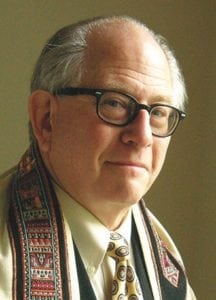Every year at the Passover seder, as we lift our kiddush cups, we read in the Haggadah: “Shelo echad bil’vad.” (Not in one country alone nor in one age have violent people risen against us. In every generation and in every land, they have stood up against us to destroy us.)
What is the lesson we learn year after year at Passover? It is a lesson about anti-Semitism or, as I prefer to label it, Jew hatred. I really don’t like the term, anti-Semitism. It sounds almost scientific. Illogical hatred is never scientific It is the very antithesis of science – crude, dirty and ignorant.
In years past, we may have tended to pass over (pun intended) this reading, which deals with Jew hatred, almost oblivious to it. This Passover we dare not ignore its warning.
Around the world, Jew hatred is on the rise. Incidents in America increased a whopping 17 percent during 2017. We read words and witness images we thought were long gone.
The nadir came this past summer in Charlottesville, Virginia. The Jewish community there became compelled to protect its synagogue as neo-Nazis marched with torches on the street in front, spewing the phrase, “Jews will not replace us!” (whatever that means).
They did this on Shabbat. In America! We were both frightened and appalled by the range of reactions to this event. Let’s be clear: Nazis are bad, all Nazis; no gray, either black or white. It is as simple as that.
Still, are we in 1939 all over again?
Why 1939?
Seventy-nine years ago, in 1939, the German American Bund filled Madison Square Garden for a huge Nazi rally. The gathering was specifically held on February 22, George Washington’s birthday, and Jew hatred was screamed with abandon.
In 1939, the year World War II began in Europe, we also watched as more than 900 German Jewish refugees on the German ocean liner St. Louis were denied sanctuary in both Cuba and the United States. More than two-thirds of them would eventually perish in Nazi death camps.
Today, being a refugee in this world is still a very dangerous thing. So what about us? What are we to do? Passover is zeman heruteinu (the time of our freedom). As we consider and, we hope, cherish the fragility of human freedom, let us draw inspiration from the words of Rabbi Abraham Joshua Heschel alav hashalom:
“Freedom means more than mere emancipation…. Freedom presupposes the capacity for sacrifice…. The glory of a free society lies not only in the consciousness of my right to be free, and in my capacity to be free, but also in the realization of my fellow man’s right to be free, and his capacity to be free.”
Perhaps Heschel’s words show us the path we must follow. As he added, “To be free means to fashion a world of acceptance and understanding.”
My dear friends, that “world of acceptance and understanding” is for us to build. We are not alone. When we left Egypt, it wasn’t just us. An erev rav, a mixed multitude of freedom-loving souls joined the Hebrews. There are many other like-minded people today who desperately want to help us. Let us find them and strive together.
To me, this is THE message and responsibility of the Jewish people as we not only observe and celebrate, but more important, live Passover.
Kane nehi ratzon! Please G-d, make this our will and the will of all people of good will.
(Rabbi Stanley R. Miles is rabbi emeritus of Temple Shalom and president of the Jewish Community Relations Council.)




